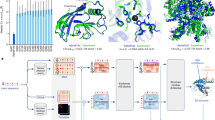Abstract
DURING some recent work, which will be described elsewhere, it was of interest to determine the Michaelis constants of succinic dehydrogenase with respect to succinic acid and succinic α — D2, α' — D2 acid (tetradeuterosuccinic acid). A number of determinations, carried out by the methods of Lineweaver and Burk1, appeared to reveal a slight difference between the Michaelis constants of the enzyme with respect to these two substrates. It was, however, desirable to obtain confirmation of this apparent difference by an independent method. The method evolved is described here since it seems to be generally applicable to problems of this type.
This is a preview of subscription content, access via your institution
Access options
Subscribe to this journal
Receive 51 print issues and online access
$199.00 per year
only $3.90 per issue
Buy this article
- Purchase on Springer Link
- Instant access to full article PDF
Prices may be subject to local taxes which are calculated during checkout
Similar content being viewed by others
References
Lineweaver, H., and Burk, D., J. Amer. Chem. Soc., 56, 658 (1934).
Haldane, J. B. S., “Enzymes” (Longmans, Green and Co., London, 1930).
Author information
Authors and Affiliations
Rights and permissions
About this article
Cite this article
THORN, M. A Method for Determining the Ratio of the Michaelis Constants of an Enzyme with Respect to Two Substratos. Nature 164, 27–29 (1949). https://doi.org/10.1038/164027a0
Issue Date:
DOI: https://doi.org/10.1038/164027a0
This article is cited by
-
Uridine-cytidine kinase III. Competition between uridine and cytidine for a single enzyme
Molecular and Cellular Biochemistry (1977)
-
A Method for Determining the Ratio of the Michael is Constants of an Enzyme with Respect to Two Substrates
Nature (1949)
Comments
By submitting a comment you agree to abide by our Terms and Community Guidelines. If you find something abusive or that does not comply with our terms or guidelines please flag it as inappropriate.



